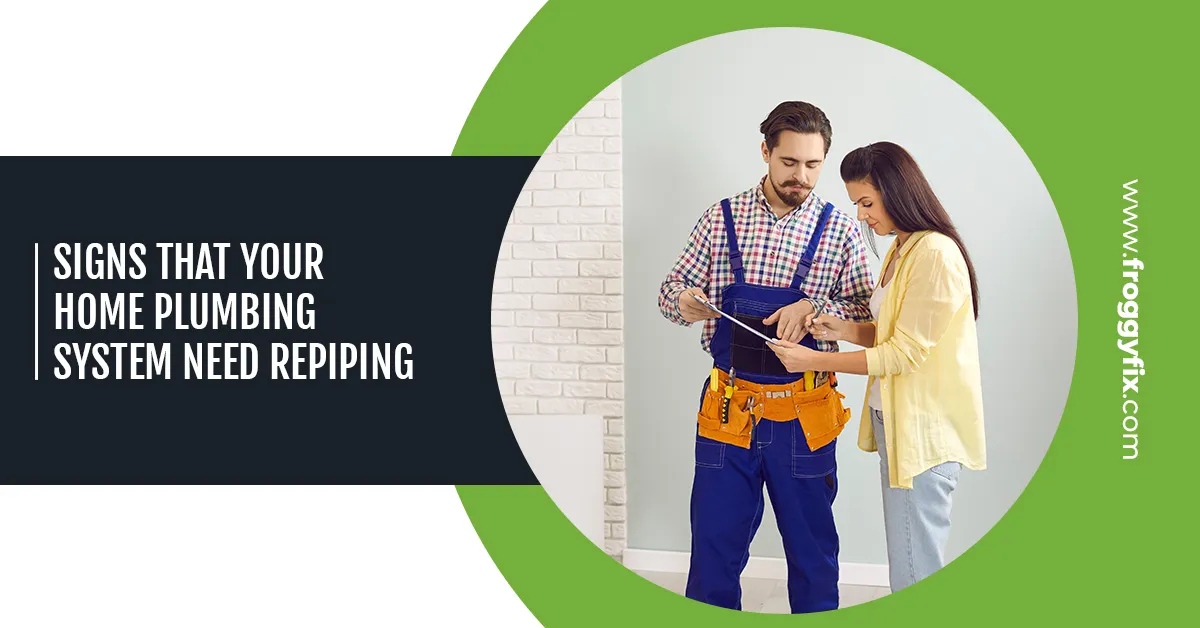

10 01
2024
A smoothly functioning plumbing system is essential for the well-being of any household. However, over time, wear and tear can take a toll on your pipes, leading to a range of issues. If you’re a homeowner, then it’s crucial to be aware of signs that you may need a plumbing repair in Glendale, AZ, when you turn on the water. In this article, we’ll explore the key indicators that your home may need repiping and address common questions surrounding this essential maintenance task.
The decision to repipe a house is not one to be taken lightly. Understanding when the time is right can save you from potential disasters and extensive repair costs. Here are some scenarios when you should consider repiping:
If your home is several decades old and still equipped with its original plumbing, it might be time for an upgrade. Older pipes are more prone to corrosion and leaks, increasing the risk of damage to your property.
If you find yourself dealing with frequent leaks or if you’re consistently calling in for plumbing repairs, it may be a sign that your pipes are deteriorating. Repiping can offer a more long-term solution than constantly patching up leaks.
Noticeable changes in your water’s color can indicate rust and corrosion within your pipes. If left unaddressed, this can lead to water contamination and health hazards for your household.
A sudden decrease in water pressure throughout your home could be a result of mineral buildup or pipe deterioration. Repiping can help restore proper water flow.
Inspect exposed pipes for signs of corrosion. If you notice rust or discolored spots, it’s an indication that the pipes are aging and may need replacement.
By addressing these factors proactively, you can make informed decisions about when to repipe your house, ensuring the longevity and efficiency of your plumbing system. To learn more about plumbing repairs in Glendale, AZ, check this out https://froggyfix.com/glendale-plumbing-repair-quality-service-in-every-fix/.
Identifying signs that your pipes may need replacement is crucial for preventing extensive damage to your home. Here are key indicators that it’s time to consider replacing your plumbing:
Ongoing leaks, despite multiple repair attempts, may signify that the structural integrity of your pipes has been compromised. Repiping can provide a lasting solution to persistent leakage issues.
If you notice brown or rusty-colored water coming from your taps, it indicates corrosion inside the pipes. Repiping can improve water quality and eliminate the risk of contaminants.
Strange noises like clanking or banging when you turn on the water could suggest loose or damaged pipes. Repiping can eliminate these noises, restoring a quieter plumbing system.
Reduced water pressure can result from mineral deposits, leaks, or pipe corrosion. Repiping ensures a consistent and adequate water flow throughout your home.
Unpleasant smells emanating from your drains could be a sign of sewer line issues or decaying pipes. Repiping can address these concerns, improving the overall hygiene of your plumbing system.
The presence of mold or mildew around your pipes indicates moisture leakage. Repiping can eliminate these damp conditions, preventing the health hazards associated with mold growth.
If your drains are frequently clogged, it may be a sign of deteriorating pipes. Repiping can enhance the drainage system, reducing the likelihood of blockages.
By staying vigilant and addressing these warning signs promptly, you can avoid major plumbing emergencies and ensure the longevity of your home’s infrastructure.
The decision to repipe your house involves a balance between upfront costs and long-term benefits. Understanding the value of repiping can help you make an informed choice. Here are some considerations to determine if it’s worth repiping your home:
One of the immediate benefits of repiping is enhanced water quality. New pipes eliminate the risk of rust and contaminants, providing you with cleaner and safer water for your household.
Repiping is an investment that can significantly boost the value of your home. Potential buyers are often willing to pay more for a property with a modern and reliable plumbing system.
While the upfront cost of repiping may seem substantial, it can save you money in the long run. Constant plumbing repairs in Glendale, AZ, and emergency fixes can add up, making repiping a cost-effective solution over time.
Repiping is a proactive step to prevent future plumbing issues. By addressing potential problems early, you can avoid the inconvenience and expense of emergency repairs.
Newer pipes are often designed to be more energy-efficient. This can lead to savings on your water and heating bills and contribute to a more eco-friendly home.
Knowing that your home is equipped with a reliable plumbing system brings peace of mind. You can go about your daily activities without the constant worry of leaks or pipe failures.
If your existing plumbing system is outdated, repiping may be necessary to comply with current building codes. This is crucial for maintaining the safety and legality of your property.
Considering these factors, it’s clear that repiping offers not only immediate benefits but also long-term advantages. It’s an investment in the well-being of your home and the comfort of your family.
Recognizing the signs that your home plumbing system needs repiping is essential for maintaining a secure and efficient living environment. For plumbing repair in Glendale, AZ, understanding when to consider repiping is crucial to preventing potential disasters and costly repairs.
By being proactive and addressing issues such as persistent leaks, discolored water, unusual noises, and low water pressure, you can make informed decisions about the future of your plumbing system. Repiping is not just a solution to existing problems; it’s an investment in the longevity, efficiency, and overall value of your home.
Consider the long-term benefits of improved water quality, increased home value, and the potential for significant cost savings. Repiping provides peace of mind, knowing that your plumbing system meets current standards and is less susceptible to future issues.